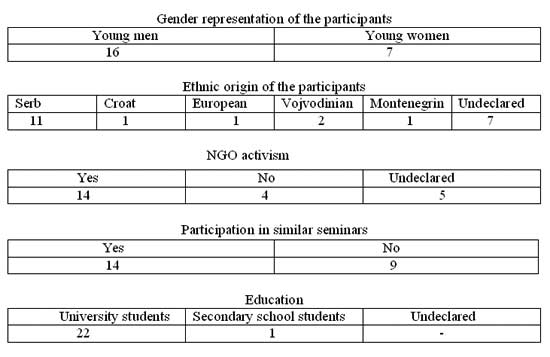PERSONALITY STRUCTURE AND
TOTALITARIAN IDEAS
Novi Sad, October 25-27, 2007
"Why is it that we know so little about good people,
benefactors?" Participants in the seminar tried to find an answer to this question
raised by director Dzemal Sokolovic in his documentary. The reason why the participants
mostly referred to was "the enormous quantity of evil deeds committed in the
territory of ex-Yugoslavia." They identified other reasons as well - "human
fascination with evil" and "the bloodthirsty public that is attracted by the
dark, destructive side of human nature." The third reason they quoted was
particularly interesting. Namely, according to some participants, our insufficient
knowledge about benefactors is to be tracked down in the evil's manipulative nature.
"Unlike good, evil is easy to manipulate. Good deeds resist manipulation and,
therefore, costly, especially in wartime. Anyway, a society rests on punishment of crime
and criminals rather than on remuneration of good deeds and benefactors."
All participants in the seminar agreed with the director's key message -
"it is of crucial significance for a society's moral renewal to have all criminals
punished, but even more crucial than that is to keep the memory of those who have done
good."
Throughout the 3-day seminar the participants discussed with keynote
speakers the topics such as "personality structure and totalitarian ideas," the
origins of radicalism and conservativism in Serbia, the role of the media in facing up the
past, the ITCY, tolerance, etc. Asked whether fascism has been present in Serbia over the
past few years, all of them replied affirmatively. However, they were not that positive
when it came to identifying the elements of fascism. Most of them put forth "extreme
nationalism," "chauvinism," "anti-Semitism" or "violent
behavior." When asked to classify demonization of political opponents either under
extreme nationalism, good nationalism or fascism, the great majority of them opted for
fascism. Poverty, hopelessness and heroization of the people who should stand trial fuels
radicalism, agreed the participants. "The bottom line here is not whether we should
confront radicalism but who are our allies /in the fight against the phenomenon/."
"How can one change public opinion when the media are used to channel
nationalism?" These were just some of the questions to which the participants were
seeking the answers together with keynote speakers.
The participants were specially captured by Zarko Korac's lecture on
personality structure and totalitarian ideas. They also spoke highly of the manner in
which Teofil Pancic and Mirko Djordjevic introduced their topics (the media and
conservativism/radicalism respectively), as well as of the arrangements and curriculum set
down by the organizers.
The curriculum was labeled as capturing and to the point. The
participants welcomed the opportunity to freely speak their mind and cross swords with
their peers and lecturers alike. They also welcomed the organizers' effort to keep them
together beyond "school hours." The participants were taken to the Serbian
National Theater in Novi Sad to see Moliere's "The Bourgeois Gentleman" staged
by the Slovenian National Theater from Maribor.
The participants themselves suggested improvements to forthcoming
seminars - according to them, such courses should last longer, include young people from
all over Serbia, focus more on polemic and encourage shy participants to speak up.
On the second day of the seminar, a reporter for the Dnevnik daily
interviewed the participants. Her story was run in the newspaper's issue of October 28,
2007. The same issue carried an interview with Prof. Zarko Korac. The Chairwoman of the
Helsinki Committee Sonja Biserko was interviewed by the Beta News Agency. Apart from
Dnevnik, Gradjanski List, TV Novi Sad and Radio 021 informed their readers, viewers and
listeners about the event.
The second seminar in the series assembled 23 young people from Novi
Sad, Vrsac, Ruma, Zrenjanin, Beocin and Bela Crkva.
This and other confidence-building seminars within the project
"Fostering Vojvodina's Multiethnic Identity" are realized with the assistance of
the European Union under the EuropeAid program.

|
